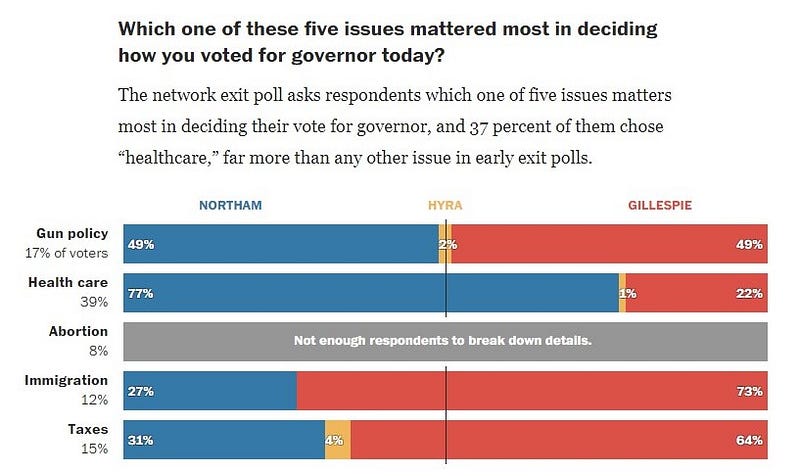We came across the White House’s talking points on the Senate tax scheme, which included a section supporting the provision that repeals our health care.
Here is what the administration isn’t saying:
- 13 million more people won’t have health insurance. The Congressional Budget Office (CBO) estimated repeal of the individual responsibility provision would result in 13 million more people without health coverage.
- Millions more people will see their premiums increase double digits. CBO also said premiums would increase 10 percent next year if the repeal provision were law.
- Repeal would hurt rural areas, including Alaska, Iowa, Missouri, Nebraska, Nevada and Wyoming. An LA Times analysis found that the health repeal provision in the Senate Republican tax scheme would “derail insurance markets in conservative, rural swaths of the country…That could leave consumers in these regions — including most or all of Alaska, Iowa, Missouri, Nebraska, Nevada and Wyoming, as well as parts of many other states — with either no options for coverage or health plans that are prohibitively expensive.”
- Many middle class people would see any tax cut they might get wiped away with higher premiums. As Sen. Susan Collins (R-ME) said, “The fact is that, if you do pull this piece of the Affordable Care Act out, for some middle-income families, the increased premium is going to cancel out the tax cut that they would get.”
Here is what they are saying — White House Talking Points:
Tax Reform Talkers
State of Play
- Republicans have a once-in-a-generation opportunity to deliver historic tax reform for the American people.
- In survey after survey, the American people say they trust Republicans more on the economy than Democrats.
- This is Congress’s opportunity to show that trust is well-placed.
- The economy is revving up because of the President’s pro-growth, pro-American jobs agenda — including his historic efforts to eliminate crushing regulations — but also in anticipation of our plan to cut taxes for the middle class and American businesses.
- Now is the time to deliver.
- This tax reform plan expands economic opportunity so that every American has a chance to reach their dreams.
- That’s what this is all about: empowering American families to build a better life for themselves and their children.
Individual Mandate
- The President supports repealing the individual mandate as part of the tax reform plan.
- The mandate — which the Supreme Court ruled is a tax — disproportionately hits the lower- and middle-income families to whom we are working to provide relief.
- 79% of people who paid the penalty had household income below $50k.
- 86% of the penalties collected were from people in households with less than $100k.
- The President’s priorities have been consistent:
- Tax cuts for middle-class families,
- Simplifying the tax code for all,
- Slashing taxes for businesses of all sizes so they can grow, create jobs, raise wages for their workers, and compete in the global marketplace.
- We support using the savings from repealing the individual mandate to provide additional economic growth and tax relief for hardworking American families.
Johnson Amendment
- The President has maintained all along that he would like to see the Johnson Amendment repealed.
- That is why earlier this year he signed an executive order establishing that, among other things:
- It shall be the policy of the executive branch to vigorously enforce Federal law’s robust protections for religious freedom.
- All executive departments and agencies (agencies) shall, to the greatest extent practicable and to the extent permitted by law, respect and protect the freedom of persons and organizations to engage in religious and political speech.
- If Congress is able to use the tax bill as a vehicle to repeal the Johnson Amendment, the White House would support it.
Delay of Corporate Rate Cut
- Cutting our corporate tax rate from 35% — the highest among our economic competitors — to 20% — among the lowest — will level the playing field for American companies so they can dominate their global competition.
- This will be an infusion of rocket fuel into the economy, empowering companies to more quickly create jobs and raise wages.
- However, even if it does not go into effect until 2019, many other important changes will go into effect on January 1st and drive massive economy growth.
- Most notably, businesses will immediately be able to deduct 100% of the money they spend on capital investments for at least the next five years.
- This will empower manufacturers to buy the heavy machinery they need to grow and thrive in America.
House and Senate Bill Differences
- The legislative process is working exactly how it is supposed to, and both bills achieve the President’s priorities:
- Tax cuts for middle-class families,
- Simplifying the tax code for all,
- Slashing taxes for businesses of all sizes so they can grow, create jobs, raise wages for their workers, and compete in the global marketplace.
- Bringing back trillions of dollars American companies currently have parked overseas.
- We are on pace to deliver a Christmas present to the American people in the form of a massive tax cut.
Small Businesses / Pass-Throughs
- Both bills reduce the tax burden on businesses of all sizes — regardless of their structure. The bills help everyone from mom and pop shops to Main Street businesses to large manufacturers and other job creators.
- The House bill lowers tax rates on pass-through business income to 0%, 12% and 25% — the lowest top rate in more than 80 years. It also provides a special low rate of only 9% for the smallest businesses.
- The Senate bill allows all pass-through businesses in all tax brackets to deduct a portion of their business income so that 17.4% of their business income is completely tax-free.
- Both bills ensure that wealthy individuals cannot avoid taxes by characterizing all of their wages as business income.
Key tax cuts expiring in 2023 in the House bill and in 2026 in the Senate bill
- If you look at history, Congress has always extended tax benefits that make sense.
- They have extended tax cuts for middle-income families, and they have extended important business tax cuts that are good for the economy.
- There’s no reason to believe that would be any different here.
Top Line Responses to Questions about Details
- Is the White House supportive of [insert specific provision currently being debated]?
- What the White House is supportive of is:
- Cutting taxes for hardworking, middle-income families
- Cutting taxes on American businesses to make them more competitive
- Making the tax code more fair by eliminating special interest loopholes and deductions
- Making the tax code more simple so that the large majority of Americans can file their taxes on a single page
- The process is moving forward the way it’s supposed to in Congress, with members having input and ironing out the details.
- But what about the elimination of [insert deduction or credit]?
- Opponents of the bill are being disingenuous, because they are focusing on the elimination of targeted tax provisions while ignoring the tax cuts in the bill.
- In other words, they’re trying to get you to focus on the little sandbox — we’re trying to give you the entire beach!
- The Washington Post fact-checkers gave Democrats FOUR PINOCCHIOS for their claim that our tax plan will raise taxes on working-class families.
- “Any Democrat who spread this claim should delete their tweets and make clear they were in error.” — Washington Post
Middle-Class Tax Cuts and Bigger Paychecks
- We’re going to put over $5,000 PER YEAR in the pockets of hardworking American families through tax cuts and pay raises.
- Here’s how:
- The typical American family of four — making the median household income of $59,000 — would save well over $1,000 per year on their taxes.
- The Council of Economic Advisors estimates that middle-income families will also see higher household income — a minimum of $4,000 higher — as a result of the business tax cut.
- That’s why the President said we’re going to give the American people “a big, beautiful present for Christmas in the form of a tax cut.”
Tax Cuts for Jobs
- Numerous analyses show our plan will produce massive job creation and economic growth.
- The Council of Economic Advisors estimates:
- 3% to 5% increase in GDP over ten years.
- That means an additional $700 billion to $1.2 trillion in economic output.
- The non-partisan Tax Foundation estimates:
- Cutting the corporate tax rate from 35% to 20% will increase long-run GDP by 3.1 percent.
- 3.9% increase in the size of the U.S. economy.
- 3.1% higher wages for American workers.

